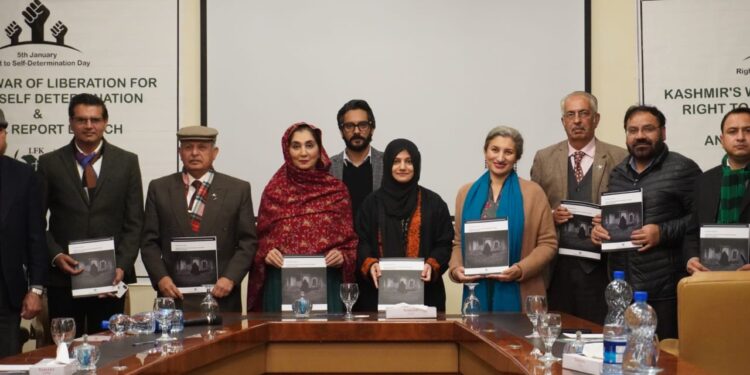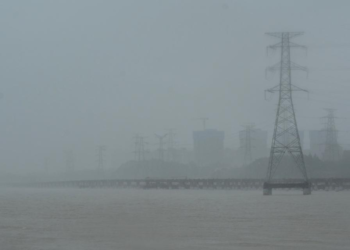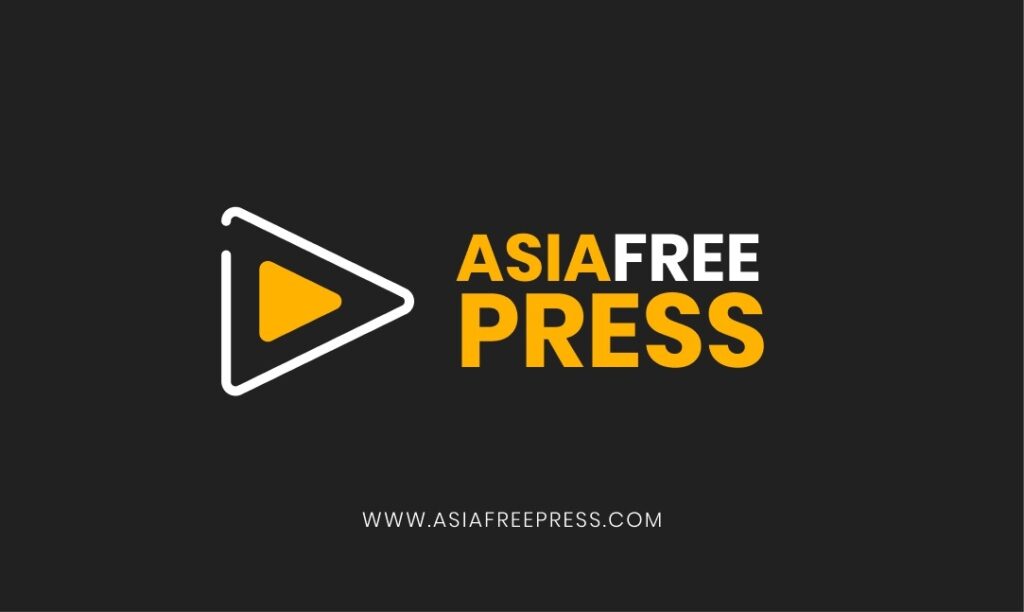Legal Forum for Kashmir launched an exhaustive Human Rights report for the year 2021, highlighting the grave Human Rights Violations perpetrated by Indian Occupying forces in Jammu and Kashmir
ISLAMABAD, Dec (Asia Free Press): A round table conference titled “Kashmir’s war of liberation for Right to self-determination” was organised by Legal Forum for Kashmir (LFK) on Wednesday to commemorate the ‘Right to Self Determination Day.
LFK also launched an exhaustive Human Rights report for 2021, highlighting the grave Human Rights Violations perpetrated by Indian Occupying forces in Jammu and Kashmir.
The session was moderated by Advocate Nasir Qadri, Executive Director LFK. The session was chaired by Ms Naureen Ibrahim, MNA, Member Parliamentary Committee on Kashmir. The panellists included Dr Zarqa Suharwardy, Member of the Senate of Pakistan; Ms Farzana Yaqoob, former Minister for Social Welfare & Women’s Development in the State of Azad Jammu and Kashmir; Dr Salma Malik, Assistant Professor at the Department of DSS, Quaid e Azam University, Islamabad; Dr Waleed Rasool, Director Institute of Dialogue, Development and Diplomatic Studies (IDDDS); Sheikh Abdul Mateen, Representative Chairman All Parties Hurriyat Conference (APHC).
While speaking at the conference, Senator Zarqa Sujarwardy stated that legal fora should be identified where perpetrators of war crimes in Kashmir would be prosecuted.
She underlined the need to engage the Kashmiri diaspora to raise awareness of Indian crimes in occupied Kashmir and bolster the fight for self-determination.
In her remarks to the panel, Ms Farzana Yaqoob, a former member of the AJK Assembly, lauded Kashmiris for their resilience in the face of Indian tyranny.
She went on to say that further efforts are needed to bring attention to the plight of Kashmiris.
“Indian authorities have harassed and intimidated Kashmiri activists like Khurram Parvez for exposing war crimes and the culprits who perpetrated them,” said Ms Yaqoob.
Addressing the panel, Dr Salma Malik said Pakistan has yet to learn a lesson from the events unfolding in Kashmir over the past seven decades.
“Conflict is inevitable if basic rights are denied even in peaceful nations,” she said, adding that there is no freedom in Kashmir and that the desire for freedom is growing among Kashmiris.
“India has denied Kashmiris of their right to self-actualisation following the unconstitutional and unilateral abrogation of Articles 370 and 35A,” she added.
She went on to say that Pakistan’s inconsistencies and unsustainable policies had cost the country more than a half-century. The legal debate over Kashmir must be the centre of attention. The international community prefers legal debate to emotional reactions.
Dr Waleed Rasool discussed the legal implications of UN Resolutions and how they were a watershed moment for Kashmir.
He said, “After the indigenous people of Kashmir began a rebellion against the Dogra Maharaja, India’s Prime Minister took the issue to the United Nations, which gave India time and eased tensions.”
He emphasised the economic imbalance between India and Pakistan while saying that Kashmiris would continue their battle despite limited resources.
He also expressed worry over the designation of Kashmir’s indigenous armed leaders as terrorists and urged all parties to settle the conflict rather than manage it.
He went on to say that India has started its settler-colonial agenda and has undertaken demographic changes, and Kashmiri Muslims fear extermination.
During his comments, Sheikh Abdul Mateen stated that the Kashmiris were promised a free and fair plebiscite in accordance with UN resolutions, but that promise is yet to be honoured after seven decades.
He went on to say that since August 5, 2019, the incidence of human rights violations has grown substantially.
“Kashmir is an unfinished partition agenda till Kashmir joins Pakistan,” he remarked.
He urged Pakistan’s government to increase the ante and internationalise the issue of Kashmir’s self-determination, noting that while the case for Kashmir is compelling, the advocacy is inadequate.
While addressing the panel, the session’s chair, Ms Naureen Ibrahim, emphasised the importance of the Right to Self-Determination Day, stating that the only solution for Kashmir is a free and fair plebiscite.
She further stated that the Kashmir problem is not a domestic or bilateral matter for India but rather an internationally recognised issue.
“Kashmiris’ right to self-determination is their birthright, for which their elders, like Sardar Ibrahim, have fought and sacrificed,” asserted Ms Noureen.
She further said the Indian intelligentsia is concerned about the horrific treatment meted out to Indian Muslims while highlighting the plight of Indian minorities.
She exhorted the UN and the Security Council to take immediate action in implementing the resolutions on the Kashmir issue, saying that the people of Pakistan have always stood by the Kashmiris and will continue to do so until the Kashmiris are given their legitimate rights.




















